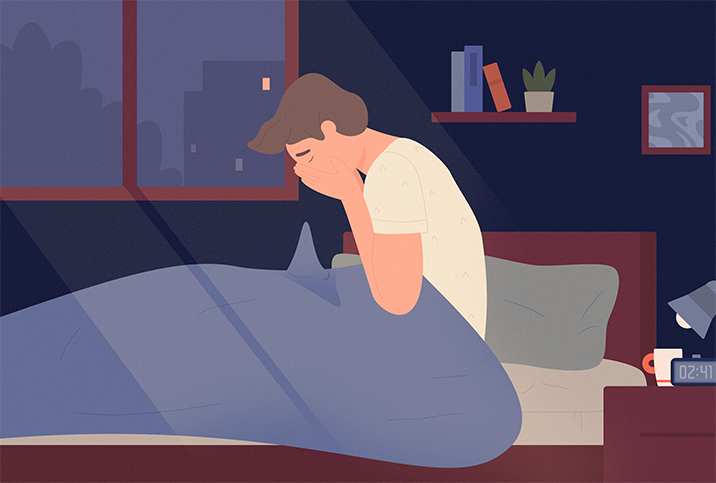Why Do I Get Random Erections?

For decades, teen movies have relied on awkward erections for easy audience laughs. You likely know the setup by now: The hormonal teenage boy finds himself in the company of an attractive love interest and grows flushed with embarrassment as his pants begin to bulge. Sometimes, he gets lucky. Mostly, he doesn't.
It is true that erections can be unpredictable, especially during puberty. But what these scenes largely fail to acknowledge is that plenty of them aren't caused by sexual arousal.
Doctors call them "spontaneous erections," and there's more to know about them than you might think. Find out what causes random erections in this article.
What causes a random erections?
It's worth spelling out how erections actually work. According to 2005 research published in Urologic Clinics of North America, there are three types of penile erections: psychogenic, reflexogenic and nocturnal.
Psychogenic erections are caused by audiovisual stimuli––porn, for example. Some videos can trigger the parasympathetic nervous system, which fires out signals to make the muscles in the spongy penile tissue relax and fill with blood. It's this rush of blood that makes the penis stiffen and expand.
The latter two types of erections are a little more varied and often spontaneous.
Reflexogenic erections are caused by sensory stimulation, so any kind of touching, fondling or rubbing can result in stiffness. However, these erections aren't always triggered by sexual arousal and aren't always intentional or predictable.
Spontaneous erections commonly occur due to "nonsexual physical touch," said Robin Finley, a licensed family and marriage therapist with Thriveworks in Greenville, South Carolina. This type of touch could be an accidental brush of your genitals or maybe a response to wearing soft or silky underwear.
Nocturnal erections: The most common kind of random erections
The most common type of spontaneous erections are nocturnal erections.
Scientists have racked their brains for years trying to figure out exactly what causes overnight erections, known as nocturnal penile tumescence (NPT), although it's more colloquially known as "morning wood."
There are various stages of sleep, but the one key to understanding overnight erections is the rapid eye movement (REM) cycle. The average person has four to five of these cycles per night, and nocturnal erections can occur during each and every one of them.
These erections are caused by a combination of hormone and nervous system fluctuation, explained Laura Purdy, M.D., a family physician in Nashville, Tennessee.
"They really have nothing to do with arousal," Purdy said. "They're a sign of a healthy nervous system and vascular system function."
Some research claims nocturnal erections are basically the body's way of alerting us to a full bladder. An article published on the University of Newcastle website rejected this explanation, instead arguing, "it's more likely…the unconscious sensation of the full bladder stimulates nerves that go up to the spine, and these respond directly by generating a [reflexogenic] erection."
Even medical professionals are still debating how nocturnal erections work, but a surefire fact is that they're spontaneous and not usually caused by sexual arousal, barring the occasional sex dream.
The role of hormones in random erections
Hormones can also be what causes random erections. In fact, another theory behind morning wood is that testosterone levels are at their highest when we wake up, hence, the highly increased likelihood of morning erections.
To revisit the awkward teen movie trope, one shred of truth is that spontaneous erections are more likely to occur during puberty, a period of hormonal chaos. Research published on StatPearls listed wet dreams and involuntary erections as part of the adolescent male puberty pattern, but Finley explained that hormone fluctuation isn't just confined to puberty.
"Hormone levels fluctuate throughout the day," she explained. "While this is more common in young males, this can be the case for men of all ages, and these fluctuations can be associated with spontaneous erections."
There's still a lack of research on sexual function in transgender patients undergoing hormone replacement therapy, both for patients who have undergone gender confirmation surgeries and those who haven't. Trans women are told that feminizing hormones, such as estrogen and progesterone, will decrease their capacity for spontaneous erections, and there is evidence to support this view, some of which is anecdotal.
However, a handful of studies and anecdotal experiences complicate the linearity of these claims. A 2004 study of 25 trans women found "testosterone is important but not essential for erectile function, and that other androgen-independent pathways can be responsible for sexually induced erections."
Seemingly, some trans women do still experience spontaneous erections, but the lack of comprehensive research and medical knowledge can often leave them crowd-sourcing advice.
There's still progress to be made in order to understand spontaneous erections, but neither Finley nor Purdy suggested they were cause for concern. If the erection refuses to budge, it could be a case of priapism, which can cause permanent damage if not medically treated quickly, but priapism tends to be painful.
They might be awkward at times, but erections without sexual arousal are much more common than some people may think.


















